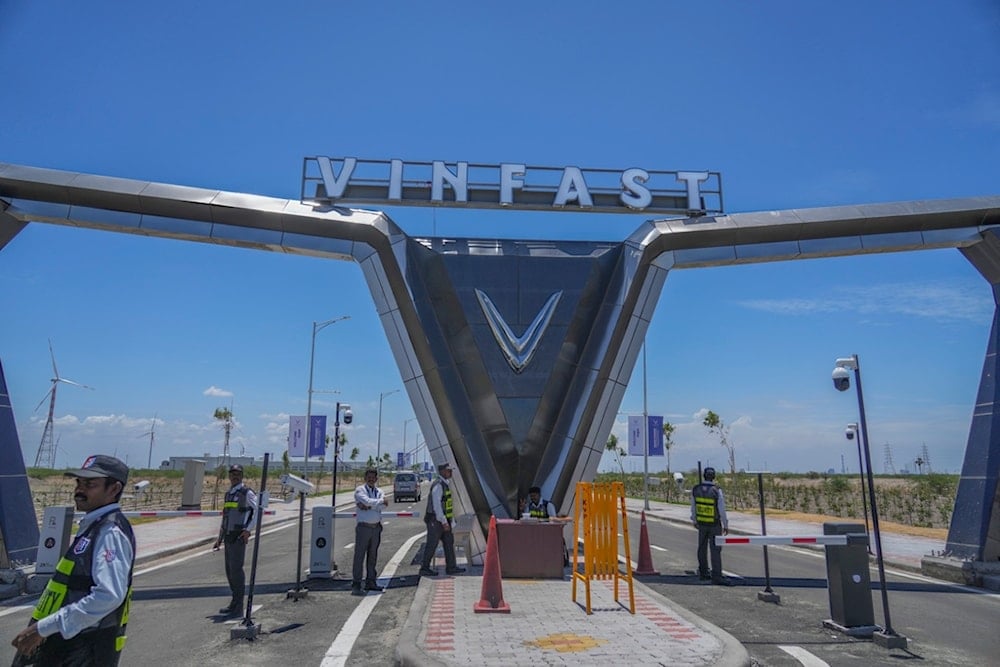Vingroup proposes $70bln railway as Vietnam backs private sector
Vietnam’s Vingroup has proposed a $70 billion high-speed railway project following a government call for private sector leadership.
-

Private security stand guard at the entrance of the VinFast electric vehicle plant in Thoothukudi, in the southern Indian state of Tamil Nadu, Monday, August 4, 2025. (AP Photo/Rafiq Maqbool)
Vietnam’s Vingroup has put forward an ambitious plan to construct a $70 billion high-speed railway network across the country, just two days after Communist Party leader To Lam urged private firms to take a leading role in infrastructure development, Reuters reported on Wednesday.
The initiative aligns with the party’s new economic framework, Resolution 68, which seeks to elevate domestic companies as national champions under state direction. Some analysts have dubbed the policy "Doi Moi 2.0," in reference to the landmark reforms of the 1980s that opened Vietnam’s economy.
According to the report, Vingroup, best known for its real estate ventures and electric car subsidiary VinFast, has also established a steel-producing arm to support the massive rail project. The conglomerate’s proposal calls for the government to finance 80 percent of the venture through long-term, interest-free loans while the company handles the remainder.
However, the plan has sparked concerns within Vietnam’s own institutions. The central bank warned that Vingroup’s high debt and lack of railway experience necessitate "special state guarantees to ensure the safety of banking operations," while the Finance Ministry cautioned that the proposed 0 percent loan would amount to a subsidy, potentially harming Vietnam’s credit rating. It also labeled the 30-year repayment schedule, with payments due only at maturity, as "very risky."
Vingroup Railway
Three people familiar with the discussions told Reuters that officials had encouraged Vingroup to bid for the project and even discussed potential real estate ventures along the planned railway. They also said support for the loss-making VinFast unit was raised during those talks.
Vingroup denied receiving preferential treatment, insisting that its "debt level was safe by international standards" and that it remained "conscious of its responsibility on strategic projects."
Financial experts, however, see risks in the government’s strategy. "Over-reliance on selected business groups to drive growth and funnelling credit through them can exacerbate concentration risks in banks’ loan portfolios," said Willie Tanoto of Fitch Ratings, though he noted that the reforms could improve resource allocation "if properly supervised."
The planned high-speed line connecting Hanoi and Ho Chi Minh City, stretching more than 1,500 kilometers, is expected to begin construction next year, with another domestic conglomerate, Thaco, also submitting a proposal.
ĐƯỜNG SẮT TỐC ĐỘ CAO BẮC – NAM: ĐẠI DỰ ÁN 67 TỶ USD VÀ CUỘC ĐUA QUYẾT LIỆT CỦA HAI ÔNG LỚN VIỆT – VINSPEED https://t.co/3RbY5L6Hes pic.twitter.com/SKsAZIbfHc
— Chợ Đất (@chodat_com_vn) October 10, 2025
Vietnam National Champions
Party documents reviewed by Reuters show that the government intends to grant "preferential policies" to Vietnamese companies involved in strategic sectors, including limited bidding and direct contracting, to strengthen the role of the private sector as a "driving force" of the economy.
Economist Nguyen Ba Hung of the Asian Development Bank said the approach clearly aims to "foster national champions with supportive measures," though he warned against allowing such conglomerates to accumulate "excessive influence."
Despite Hanoi’s optimism, foreign investors have reacted cautiously. Data reviewed by Reuters show investment pledges fell 5 percent in the five months following Resolution 68’s release, while foreign ownership of Vietnamese stocks declined to around 15 percent.
As one foreign diplomat told the outlet, the strategy resembles models elsewhere in Southeast Asia "where politically-connected conglomerates operate inefficiently in protected sectors," raising questions about Vietnam’s balance between national ambition and market discipline.
Read more: US eyes closer military ties with Vietnam as arms talks advance

 3 Min Read
3 Min Read








